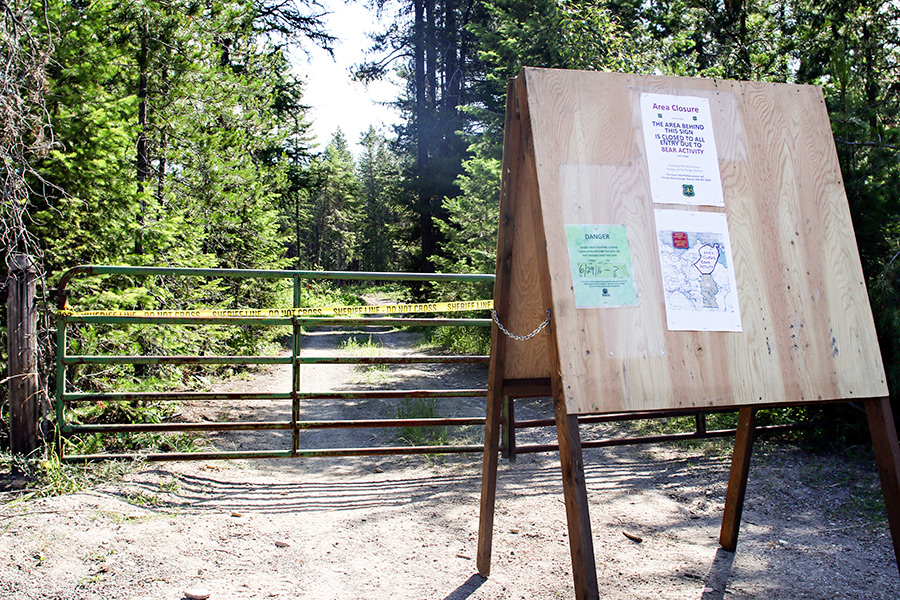Review: Surprise Bike Collision with Grizzly Caused West Glacier Fatality
Board of Review Report details circumstances of Officer Brad Treat’s death, issues safety recommendations
By Tristan Scott
The circumstances surrounding U.S. Forest Service Officer Brad Treat’s fatal collision with a grizzly bear while mountain biking last summer are detailed in a final report released this week, confirming that the 38-year-old West Glacier man accidentally surprised the bruin on a narrow trail, prompting the attack.
The report was issued by a special interagency Board of Review consisting of state and federal wildlife officials, and chaired by retired U.S. Fish and Wildlife Service grizzly bear biologist Chris Servheen.
The board released its investigation findings and further safety recommendations March 6.
According to the report, on the afternoon of June 29, 2016, Treat was mountain biking with a companion on the “Green Gates Trails” area near West Glacier when he rounded a blind corner at a high rate of speed and collided with the male grizzly.
Treat, who was wearing cycling shoes that clip into the pedals, hurtled over the handlebars and into or over the bear, according to the report. Riding ahead of his companion, Treat was traveling 20-25 mph at the time of the impact, which occurred out of the companion’s sight. However, the companion heard the sound of the collision and the bear make a noise “like it was hurt,” according to the report.
When the companion came around the curve in the trail, he saw Treat on the ground with the bear standing over him about 37 feet away. After waiting for approximately 30 seconds trying to figure out what to do, the companion turned around and went back up the trail to seek help, not sure how the bear would react if he attempted to “push” it off Treat.
The companion said the bear was “intent and focused on Treat” and did not turn toward the companion at all.
Neither Treat nor the companion were carrying bear spray or firearms, and the report states that the companion was “understandably uncomfortable” given that he carried no deterrent.
Investigators said there were no skid marks on the trail, indicating that Treat did not have time to brake prior to the collision.
“The lack of evasive steering and lack of skidding are further evidence of the surprise and high speed of the collision,” the report states.
At a rate of 20-25 mph, there were only one or two seconds between rounding the curve, seeing the bear and colliding with the animal, according to the report.
The force of the collision with the bear apparently propelled Treat into the handlebars, causing a straight-line bruise across the inside of the lower front part of his ribs. When the force of the collision hurled Treat over the bear, he broke both of his wrists and his left scapula trying to break his fall, the report states.
The bear involved was an 18-20-year-old male grizzly with no history of human conflict. Its identity was determined by the presence of DNA on hair samples collected from the victim and his helmet, which was in pieces after having been bitten by the bear.
The grizzly had previously been captured in Glacier National Park in 2006 as part of a research project.
The bear did not consume any part of Treat, and apparently left the area soon after the incident, the report states.
“Bears involved in such surprise encounters are not captured or removed in most cases, even when the result of the encounter is serious injury or death to a human,” the report states.
Following the investigation, the Board of Review members also released a set of recommendations related to mountain biker safety in bear country.
The recommendations include suggestions to stay vigilant, slow down, carry bear spray, make noise, don’t ride alone, never ride at dusk, dawn or night, don’t think “it won’t happen to me” and remember bears live there and you are just a visitor.
At a memorial service following his death, Treat was remembered as a dedicated and skilled law enforcement officer for the U.S. Forest Service who was born and raised in Kalispell.
A standout athlete, Treat graduated from Flathead High School in 1996, and went on to graduate from the University of Montana with a master’s degree in criminology before working as a law enforcement officer for 15 years on the Hungry Horse Ranger District.
Treat jogged the trail on which he encountered the bear nearly every morning, including with his wife on the morning of the attack, according to the report.